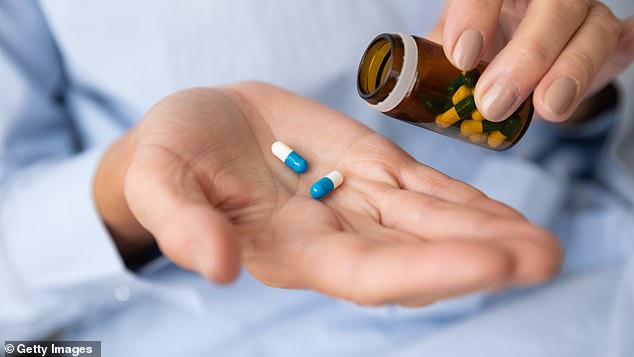Kicking antidepressants is not as risky as once feared – as new study finds only one in six patients suffered withdrawal symptoms
Tapering off antidepressants is not as risky as previously feared, with only one in six patients experiencing withdrawal symptoms, a large-scale study suggests.
Researchers say their findings should reassure people who could benefit from the drugs but worry about side effects if they stop taking them.
The analysis, the largest of its kind, shows that 15 percent of users experience one or more complaints that are directly caused by stopping the pills.
But only 2 to 3 percent suffer severe symptoms, according to results published in The Lancet Psychiatry.
Previous research has suggested that 56 percent of patients may experience withdrawal symptoms, although experts say this figure is not robust.
Withdrawing from antidepressants is not as risky as previously feared, with only one in six patients experiencing withdrawal symptoms, a major study suggests (file pic)

Fifteen percent of users experience one or more symptoms directly caused by stopping antidepressants, but only 2 to 3 percent have serious symptoms, according to results published in The Lancet Psychiatry (file pic)
The most commonly reported conditions were dizziness, headache, nausea, insomnia and irritability.
Withdrawal symptoms typically occur within a few days, and the new study found that they lasted from 1.5 to 196 days.
Researchers in Germany looked at a range of antidepressants for their work, including data from 21,000 patients involved in 79 studies.
Nearly three-quarters (72 percent) of respondents were women and the average age was 45 years.
Of a list of eleven individual antidepressants, citalopram, sertraline and fluoxetine – the most commonly used in Britain – had the lowest risk of withdrawal symptoms.
For example, according to researchers, fluoxetine takes longer to leave the body and may cause fewer withdrawal symptoms.
But venlafaxine, which is also used in Britain, was second highest for people experiencing symptoms.
The NHS and Royal College of Psychiatrists advise doctors to work with patients to develop a plan to slowly reduce their dose of antidepressants in an attempt to reduce the risk.
Dr. Jonathan Henssler, from Charite – Universitatsmedizin Berlin, an author of the study, said: ‘There is strong evidence that antidepressants can be effective for many people experiencing depressive disorder, alone or in addition to other treatments such as psychotherapy.
‘However, they do not work for everyone and some patients may experience unpleasant side effects.
‘In patients who have recovered with the help of antidepressants, the decision of doctors and patients may be to stop taking them in time.
‘That’s why it’s important that both doctors and patients have an accurate, evidence-based view of what can happen when patients stop taking antidepressants.

Of a list of eleven individual antidepressants, citalopram, sertraline and fluoxetine – the most commonly used in Britain – had the lowest risk of withdrawal symptoms
‘It is important to note that antidepressant withdrawal symptoms are not due to antidepressants being addictive.
‘It is crucial that all patients coming off antidepressants are counseled, monitored and supported by healthcare professionals.
‘However, our findings, which consolidate data from a large number of studies, should also provide reassurance that rates of discontinuation symptoms are not as high as some previous individual studies and reviews have suggested.’
The study found that stopping use of imipramine, paroxetine and venlafaxine was associated with a higher risk of severe symptoms compared to other antidepressants.
Dr. Sameer Jauhar, a consultant psychiatrist at King’s College London, said previous estimates of withdrawal symptoms were high.
He added: ‘This new in-depth review and meta-analysis indicates that the rates are much lower, and also occur in people coming off placebo, as opposed to antidepressants.
‘If we take placebo into account, the percentages of withdrawal symptoms are around 14 percent, and 2 percent for severe withdrawal symptoms.
‘It must be recognized that this only covers those participating in trials, although this is the best evidence we have.
‘Clinically, clinicians will still need to have conversations about discontinuing medications and doing so safely, although it will be gratifying to know that withdrawal rates are not nearly as high as reported.’
